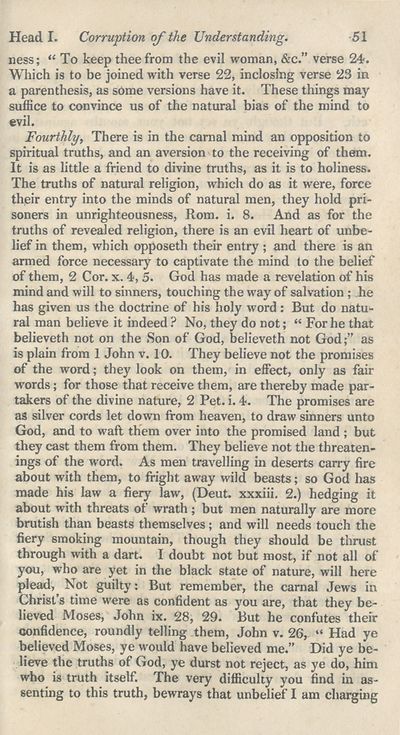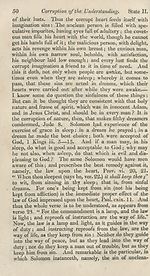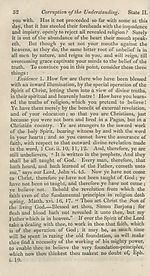Download files
Complete book:
Individual page:
Thumbnail gallery: Grid view | List view

Head I. Corruption of the Understanding. 51
ness; “ To keep thee from the evil woman, &c.” verse 24.
Which is to be joined with verse 22, inclosing verse 23 in
a parenthesis, as some versions have it. These things may
suffice to convince us of the natural bias of the mind to
evil.
Fourthly, There is in the carnal mind an opposition to
spiritual truths, and an aversion to the receiving of them.
It is as little a friend to divine truths, as it is to holiness.
The truths of natural religion, which do as it were, force
their entry into the minds of natural men, they hold pri¬
soners in unrighteousness, Rom. i. 8. And as for the
truths of revealed religion, there is an evil heart of unbe¬
lief in them, which opposeth their entry ; and there is an
armed force necessary to captivate the mind to the belief
of them, 2 Cor. x. 4, 5. God has made a revelation of his
mind and will to sinners, touching the way of salvation; he
has given us the doctrine of his holy word : But do natu¬
ral man believe it indeed? No, they do not; “ For he that
believeth not on the Son of God, believeth not God;” as
is plain from 1 John v. 10. They believe not the promises
of the word; they look on them, in effect, only as fair
words; for those that receive them, are thereby made par¬
takers of the divine nature, 2 Pet. i. 4. The promises are
as silver cords let down from heaven, to draw sinners unto
God, and to waft them over into the promised land ; but
they cast them from them. They believe not the threaten-
ings of the word. As men travelling in deserts carry fire
about with them, to fright away wild beasts; so God has
made his law a fiery law, (Deut. xxxiii. 2.) hedging it
about with threats of wrath ; but men naturally are more
brutish than beasts themselves; and will needs touch the
fiery smoking mountain, though they should be thrust
through with a dart. I doubt not but most, if not all of
you, who are yet in the black state of nature, will here
plead, Not guilty; But remember, the carnal Jews in
Christ’s time were as confident as you are, that they be¬
lieved Moses, John ix. 28, 29. But he confutes their
confidence, roundly telling them, John v. 26, “ Had ye
believed Moses, ye would have believed me.” Did ye be¬
lieve the truths of God, ye durst not reject, as ye do, him
who is truth itself. The very difficulty you find in as¬
senting to this truth, bewrays that unbelief I am chaining
ness; “ To keep thee from the evil woman, &c.” verse 24.
Which is to be joined with verse 22, inclosing verse 23 in
a parenthesis, as some versions have it. These things may
suffice to convince us of the natural bias of the mind to
evil.
Fourthly, There is in the carnal mind an opposition to
spiritual truths, and an aversion to the receiving of them.
It is as little a friend to divine truths, as it is to holiness.
The truths of natural religion, which do as it were, force
their entry into the minds of natural men, they hold pri¬
soners in unrighteousness, Rom. i. 8. And as for the
truths of revealed religion, there is an evil heart of unbe¬
lief in them, which opposeth their entry ; and there is an
armed force necessary to captivate the mind to the belief
of them, 2 Cor. x. 4, 5. God has made a revelation of his
mind and will to sinners, touching the way of salvation; he
has given us the doctrine of his holy word : But do natu¬
ral man believe it indeed? No, they do not; “ For he that
believeth not on the Son of God, believeth not God;” as
is plain from 1 John v. 10. They believe not the promises
of the word; they look on them, in effect, only as fair
words; for those that receive them, are thereby made par¬
takers of the divine nature, 2 Pet. i. 4. The promises are
as silver cords let down from heaven, to draw sinners unto
God, and to waft them over into the promised land ; but
they cast them from them. They believe not the threaten-
ings of the word. As men travelling in deserts carry fire
about with them, to fright away wild beasts; so God has
made his law a fiery law, (Deut. xxxiii. 2.) hedging it
about with threats of wrath ; but men naturally are more
brutish than beasts themselves; and will needs touch the
fiery smoking mountain, though they should be thrust
through with a dart. I doubt not but most, if not all of
you, who are yet in the black state of nature, will here
plead, Not guilty; But remember, the carnal Jews in
Christ’s time were as confident as you are, that they be¬
lieved Moses, John ix. 28, 29. But he confutes their
confidence, roundly telling them, John v. 26, “ Had ye
believed Moses, ye would have believed me.” Did ye be¬
lieve the truths of God, ye durst not reject, as ye do, him
who is truth itself. The very difficulty you find in as¬
senting to this truth, bewrays that unbelief I am chaining
Set display mode to:
![]() Universal Viewer |
Universal Viewer | ![]() Mirador |
Large image | Transcription
Mirador |
Large image | Transcription
| Antiquarian books of Scotland > Religion & morality > Human nature in its fourfold state > (69) |
|---|
| Permanent URL | https://digital.nls.uk/118584524 |
|---|
| Description | Thousands of printed books from the Antiquarian Books of Scotland collection which dates from 1641 to the 1980s. The collection consists of 14,800 books which were published in Scotland or have a Scottish connection, e.g. through the author, printer or owner. Subjects covered include sport, education, diseases, adventure, occupations, Jacobites, politics and religion. Among the 29 languages represented are English, Gaelic, Italian, French, Russian and Swedish. |
|---|

